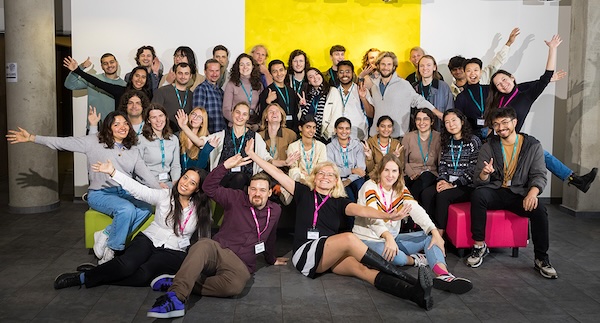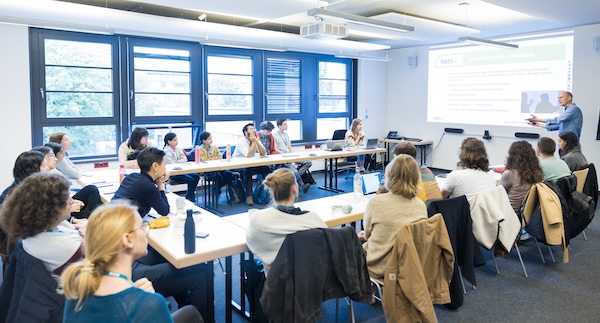

Photos: © Kay Herschelmann / MATH+
On 10 October, we welcomed all new students for the BMS Orientation Day. The BMS Chair, Holger Reich, informed the Phase I students about all relevant aspects of the BMS PhD program, such as Basic and Advanced Courses, the Qualifying Exam, the MATH+ Friday Colloquia, and the BMS Mentoring program. Soft-Skills Seminars were introduced, and funding opportunities for conferences, summer schools, and German language courses explained. The MATH+ Managing Director, Nadja Wisniewski, and our Gender and Diversity Manager, Tanja Fagel, introduced the new Phase II students of the relevant details. The BMS Coordinator, Annika Preuß-Vermeulen, gave a talk on Mental Health and where to find help in case of need for Phase I students in the morning and for the junior researchers (incl. Postdocs and Junior Research Group leaders) in the afternoon.
The lunch break brought all newcomers and experienced BMS students and alumni together and gave everyone a chance to get to know each other and share tips in a relaxed atmosphere.
For the new Phase I students the day was concluded with presentations of the Basic Courses offered this semester, while the Phase II students and Postdocs heard a talk on Research Data Management by Tim Hasler, MATH+ Chief Data Officer. The Postdoc Orientation in the late afternoon started with a warm welcome by MATH+ Co-Chair, Martin Skutella, who together with the Postdoc Liaison Officer, Theo Roelofs, provided the new researchers with targeted information on opportunities and services at MATH+. This included such pressing topics as career development and its strategies, how to gain teaching experience, and the importance of becoming a mentor as well as finding a mentor for themselves. Funding opportunities and services at MATH+, service information about graduate services at FU, HU and TU and the BUA Postdoc Academy, and instructions on MATh+ publications were also explained. The orientation session ended with introducing the MATH+ Postdoc Representatives at MATH+ who participate in MATH+ Board and BMS Committee meetings.
The BMS Orientation week also encompassed many other helpful and also fun activities to prepare the students for studying and living in Germany and Berlin, like an Intercultural Training, a Master Regulations Meeting, and Campus Tours with the Student Representatives. A Walking Tour through Berlin and a food tour organized by the Student Representatives concluded the program.
We hope all groups took advantage of the valuable pieces of information and networking opportunity and had a great start at the BMS/MATH+. We look forward to seeing everyone again at the many BMS/MATH+ activities.
LINKS:






















